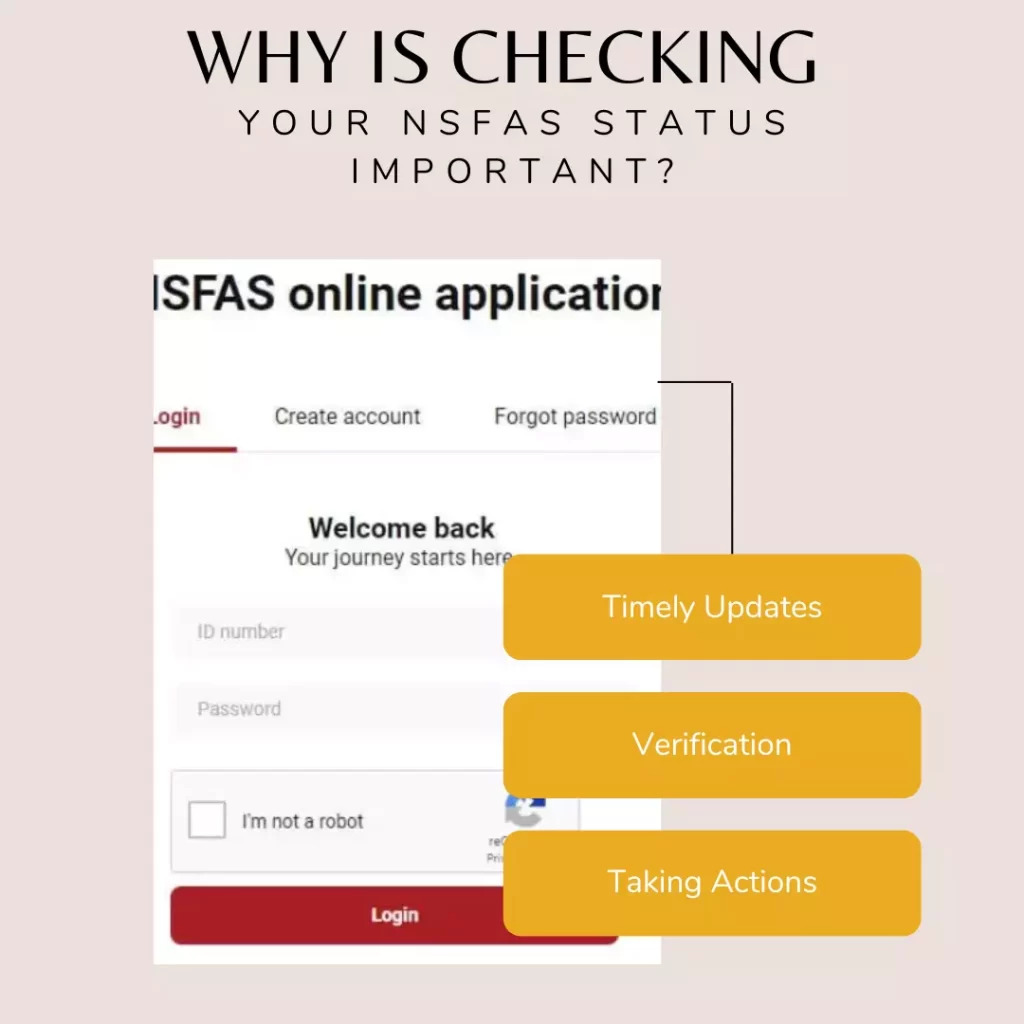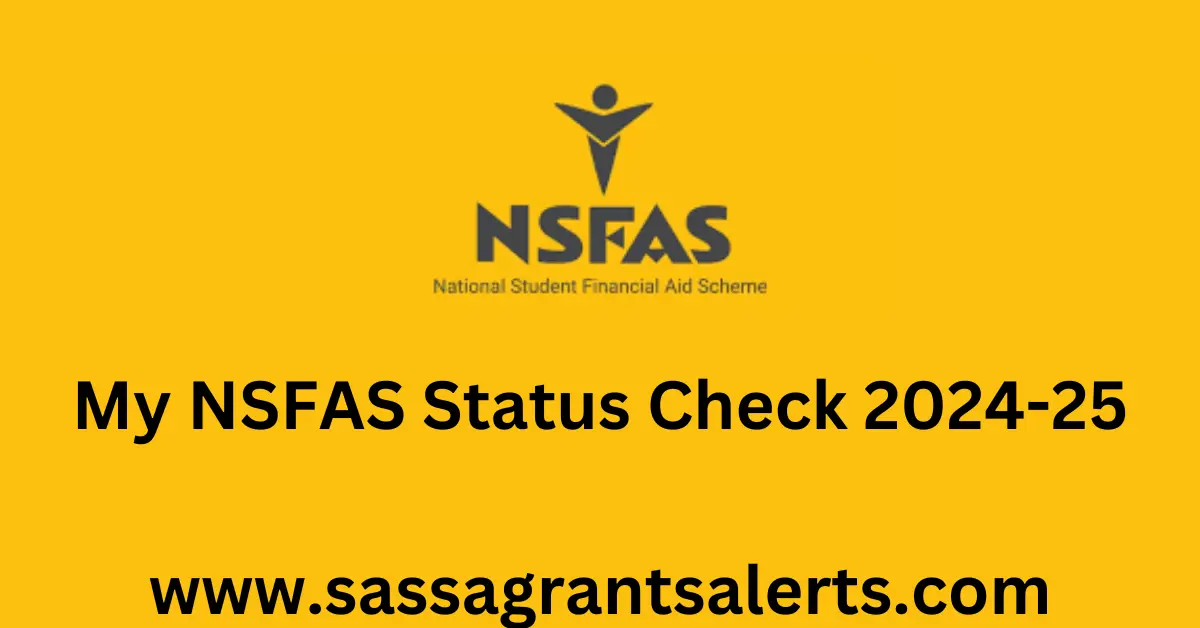NSFAS Status Check: If you’re eager to discover how to do My NSFAS status check, you’ve come to the right place. We have a comprehensive guide that will assist you in viewing your NSFAS application status online or through WhatsApp. With this step-by-step walkthrough, you’ll be able to effortlessly track the progress of your application. Let’s delve into the details:

The Website allows you to view your status as a NSFAS member.
The first method you will find on this website is the easiest. We will use this method to show you exactly how to verify the status of your NSFAS account using NSFAS’ official website. Start now.
- Use the NSFAS website to access their student portal, my.nsfas.org.za.
- Log in using your username and your password.
- To check the status for your scholarship, click the “track funding progress” link on the following page.
Also Read: SASSA Grants Applicants Face a variety of challenges
WhatsApp Chat Online to Check your NFAS
WhatsApp Chat is the other way you can check on your NSFAS award status. This is the way to go:
- Dial “+27 28 519 8006” on your mobile.
- This number can be saved as your “myNSFAS Statute” or by any name that you prefer.
- You can now create a brand new WhatsApp chat by opening your app.
- Begin a chat with your recipients by choosing “myNSFAS Status” and adding them to the list.
- They will tell you your current application status. Ask them for your basic ID, etc. and then they can guide you.
- After you have submitted your application, the company will notify you of its status.
USSD Codes to NSFAS Status Check
USSD Codes are the only way to determine your NSFAS. For this, all you need is a phone that has a cellular connection. You can use this tool in the following way:
- Check that your phone has a working cellular connection.
- Enter “12067327# in your dialer.
- After tapping on the send button, you will need to follow all of the subsequent commands.
- NSFAS gives you the current status of payment after prompting.
What Is NSFAS?
NSFAS means the National Student Financial Aid Scheme. South Africa’s National Student Financial Assistance Scheme provides financial support to students in need of tertiary-level education. NSFAS has a range of different financial aid options, like loans and bursaries to help students pay for their tuition fees and cover living expenses, as well as accommodation and textbooks.
The Department of Higher Education and Training of the South African Government manages this scheme. Primary objective of this scheme is to ensure that students from underprivileged backgrounds have equal access. NSFAS helps deserving candidates to reach their academic and career goals by providing financial support.
Also Read: Family Support Services South Africa
NSFAS funds are only available to applicants who meet the eligibility requirements. These include financial need as well as academic performance and citizenship. Both undergraduate and postgraduate South African students can apply to the scheme.
NSFAS statuses: What they mean
If you check your NSFAS, you will see different statuses. These indicate a certain stage of the application process. Below are some NSFAS-related statuses.
Application Submitted
You will see this status if you successfully submit your NSFAS application. The status shows that the application was received, and it is currently in its initial processing stage.
Filtering
NSFAS will review all of the applications that have been submitted in the Filtering Stage to ensure they are complete and valid. This ensures that only applications which are eligible will be considered for the next phase.
Validation
Once you have passed the filtering stage and entered the validation stage, NSFAS will verify the accuracy of the information provided in your application. NSFAS validates the correctness and authenticity of information in your application. To validate your eligibility, they may require additional documents or run further checks.
It is worth mentioning that
During the assessment stage, you will be asked to evaluate your application in detail, taking into consideration factors such as your financial situation, academic record, and any other criteria for eligibility. This evaluation will help determine your eligibility to receive NSFAS financial support.
Funding Eligibility
When your application meets the eligibility requirements, you will receive a label that says “Funding” which means, you may be entitled to financial aid through NSFAS.
Waiting on Academic Results/Admissions
The status of your application may read “Awaiting Academic results” or “Awaiting Admittances” if you are waiting for your admission confirmation or academic results. They are needed for a further evaluation of your eligibility.
Awaiting Registration
It is possible that you will be given the “Awaiting Registraiton” status after meeting academic requirements. It means that before applying for NSFAS funds, you must first register as an undergraduate student.
Signing an agreement
Sign the NSFAS financing agreement once all steps are completed. This document outlines all the details of your financial support.
NSFAS funds are only available to applicants who meet the eligibility criteria. These include financial need as well as academic performance and citizenship. Both undergraduate and postgraduate South African students can apply to the scheme.
Payments
It is important to note that the “Payments Status” indicates your funding approval and NSFAS’s start of disbursement. According to your agreement, the funds should be received according to schedule.
What should I do if my application is rejected?
There are ways to deal with a rejected NSFAS. What to do when you are rejected
Reject Reasons:
You should carefully read the explanation provided. The reason for the decision will make it easier to comprehend. Common rejections include not fulfilling academic requirements, missing documents, and incomplete applications. You can take the next steps based on what you learn.
You may appeal the decision
The decision can be appealed if the applicant believes there was an oversight or has additional information to support the claim. For more details on how to appeal, you can visit the NSFAS web site or phone their helpline. To support your appeal, follow the instructions. Submit any necessary documents or evidence.
Consult a professional for guidance
For assistance, you can call the NSFAS hotline for clarification or come to their office for advice. This can help clarify why the application was rejected, as well as offer guidance on how to proceed.
How to Improve Your Application
Reapplying for NSFAS is possible if the appeal you made was unsuccessful, or if alternative funding cannot be secured. You can use this chance to improve any shortcomings or weak points in your original application. Resubmitting your application will allow you to improve on your previous performance. Gather all documents necessary, enhance your grades, and check that it is correct.
What is the difference between SASSA grant R350 status and NSFAS eligibility?
There are two different programs, both with their own goals and requirements. This is the difference:
SASSA R350 grant
SASSA R350 was an interim social assistance grant provided by South African Social Security Agency. The program was launched in response to the financial impact of COVID-19. This grant is meant to offer short-term help for those who have lost their jobs and do not receive other forms of income. It’s intended to reduce extreme poverty by addressing immediate financial needs.
SASSA R350 grants are only available to South Africans who meet the criteria. The SASSA R350 is for South Africans over the age 18 or currently unemployed. The grant’s purpose is to provide financial assistance to individuals to meet their everyday living expenses. It is not tied specifically to educational pursuits or education.
NSFAS Status
NSFAS on the other side is National Student Financial Aid Scheme. It’s a financial aid program for South Africans pursuing post-secondary education. NSFAS has a range of financing options including bursaries or loans that can help with tuition fees and other expenses.
NSFAS applicants are required to meet eligibility requirements such as financial need, academic standards, and enrollment in an accredited school. NSFAS has as its primary objective to increase access to higher learning and to help students with disadvantaged backgrounds.
In summary, the SASSA R350 grant is a short-term social relief program for unemployed individuals, while the NSFAS program provides financial assistance specifically for students pursuing higher education. They serve different purposes and have distinct eligibility requirements and application processes.
Conclusion
So, navigating the processes of checking your NSFAS status, dealing with rejection, and understanding the differences between the SASSA R350 grant and the NSFAS program can be crucial steps in accessing financial support in South Africa. It is important to stay informed, follow the guidelines provided by the respective organizations, and seek assistance when needed.
